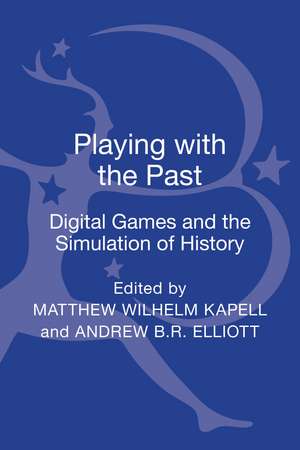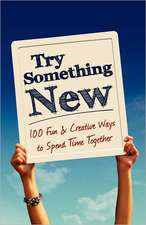Playing with the Past: Digital Games and the Simulation of History
Editat de Matthew Wilhelm Kapell, Andrew B.R. Elliotten Limba Engleză Hardback – 18 dec 2013
| Toate formatele și edițiile | Preț | Express |
|---|---|---|
| Paperback (1) | 261.64 lei 6-8 săpt. | |
| Bloomsbury Publishing – 18 dec 2013 | 261.64 lei 6-8 săpt. | |
| Hardback (1) | 835.11 lei 6-8 săpt. | |
| Bloomsbury Publishing – 18 dec 2013 | 835.11 lei 6-8 săpt. |
Preț: 835.11 lei
Preț vechi: 1067.50 lei
-22% Nou
Puncte Express: 1253
Preț estimativ în valută:
159.82€ • 166.24$ • 131.94£
159.82€ • 166.24$ • 131.94£
Carte tipărită la comandă
Livrare economică 15-29 aprilie
Preluare comenzi: 021 569.72.76
Specificații
ISBN-13: 9781623566142
ISBN-10: 1623566142
Pagini: 400
Ilustrații: 25
Dimensiuni: 152 x 229 x 33 mm
Greutate: 0.68 kg
Ediția:New.
Editura: Bloomsbury Publishing
Colecția Bloomsbury Academic
Locul publicării:New York, United States
ISBN-10: 1623566142
Pagini: 400
Ilustrații: 25
Dimensiuni: 152 x 229 x 33 mm
Greutate: 0.68 kg
Ediția:New.
Editura: Bloomsbury Publishing
Colecția Bloomsbury Academic
Locul publicării:New York, United States
Caracteristici
Offers cogent analyses of specific games and historical theories, to broaden perspectives in both fields
Notă biografică
Matthew Wilhelm Kapell has graduate degrees in biological anthropology and history as well as a Ph.D. in American Studies. He has published on genetics, urban history, African colonial history, as well as four books in film and television studies and has taught extensively in the United States and Great Britain.Andrew B.R. Elliott is a Lecturer in Media and Cultural Studies at the University of Lincoln, UK, where he teaches cultural studies, media studies, history, film, and television. He is the author of Remaking the Middle Ages (2010) which concerns itself with authenticity, violence, and a semiotic reconstruction of the medieval period.
Cuprins
Acknowledgements1. Introduction: To Build a Past that Will "Stand the Test of Time": Discovering Historical Facts, Assembling Historical Narratives, Andrew B.R. Elliott and Matthew Wilhelm Kapell Part I: History as a Process: Teleology, Causation and Technological Determinism2. The Same River Twice: Historical Representation and the Value of Exploring Societal Concepts in the Total War, Civilization, and Age of Empires Franchises, Rolfe Daus Peterson, Andrew Miller and Sean Joseph Fedorko 3. What is "Old" in Videogames? Dan Reynolds 4. "Affording History": Applying the Ecological Approach to Historical Videogames, Adam Chapman Part II: History written by the West: Self, Other and Non-Western History5. Phantasms of Rome: Video Games and Cultural Identity, Emily Joy Bembeneck 6. Modeling Indigenous Peoples: Unpacking Ideology in Sid Meier's Colonization, Rebecca Mir and Trevor Owens 7. Dominance and The Aztec Empire: Representations in Age of Empires II and Medieval Total War II, Joshua D. Holdenried with Nicolas Trépanier8. From History to Literature to Game: Three Kingdoms and the Cultural Significance of Asian History, Hyuk-chan Kwon 9. Falling in Love with History: Japanese Girls and Otome Games, Kazumi Hasegawa Part III: User-Generated History: Realism, Authenticity and the Playable Past10. Selective Authenticity and the Playable Past, Andrew J. Salvati and Jonathan M. Bullinger 11. The Promise of Simulation: Realism, Authenticity, Virtuality, Josef Köstlbauer 12. Modding the Historians' Code: Historical Verisimilitude and the Counterfactual Imagination, Tom Apperley 13. Modding as Historical Reenactment: A Case Study of the Battlefield Series, Gareth CrabtreePart IV: The Politics of Representation: Authenticity and Realism14. Historical Veneers: Anachronism, Simulation and History in Assassin's Creed II, Douglas N. Dow 15. Air Power vs. Processing Power: Technology and Narrative Possibilities in WWI Video Gaming, Andrew Wackerfuss 16. Videogames in the popular Culture of Remembrance of the Cold War: A Case Study of Call of Duty: Black Ops, Clemens Reisner 17. Refighting the Cold War: Video Games and Speculative History, Marcus SchulzkePart V: Looking Back on the End of the World: History as Utopian Possibility 18. Strategic Digital Defense: Video Games and Reagan's 'Star Wars' Program, 1980-1987, William M. Knoblauch 19. Fallout and the History of Yesterday's Impossible Tomorrow, Joseph A. November 20. History Out of Time: Fallout's Ironic America, Tom Cutterham21. The Historical Conception of Biohazard in Biohazard, Robert Mejia and Ryuta Komaki22. The Struggle with Gnosis: Ancient Religion and Future Technology in the Xenosaga Series, Erin Evans 23. Conclusion: Playing at True Myths, Engaging with Authentic Histories, Matthew Wilhelm Kapell and Andrew B.R. ElliottIndex
Recenzii
Playing with the Past is a serious cultural contemplation on a media genre that forever changed the way a generations thinks. An engaging exploration into the way media engages and redefines history, Playing with the Past is a groundbreaking work in Media Studies and an essential text for the study of video games and the history of ideas.
Elliott and Kapell have gathered a remarkable collection of contributions-engaging deep issues about what history IS, and how one can present its issues in a vital contribution within contemporary studies. The scope is compendious, from Rome to Native America, from Japan to Colonial America; this book just might become the basis for up-to-the-minute narrative/historical/digital mediations, and should be of interest in the many fields of the superior college or university.
Playing with the Past is an innovative, lucid and engaging collection that strikes a number of carefully constructed and rewarding balances. The tone is both serious and playful. Its analysis and findings are simultaneously rigorous, illuminating and entertaining. Playing with the Past provides a neat summation of the previous work which has explored the relationship between digital games and their interaction with history as a foundation to establish, with great sophistication and clarity, the critical and conceptual terrain for the current and future debates.
Playing with the Past is a far-reaching volume, guiding readers through ancient civilizations, modern wars, and futures premised upon counterfactual pasts. In this reflexively-organized array of essays, game scholars will find both a primer on historiographic inquiry and a series of cogent analyses that are not simply conversant with issues driving the field but also bring new depth and insight to their examination.
The individual contributors handle their parts in this ambitious program well. Each chapter involves a kind of ethnographic exploration of its particular game space, often with first-person reports (though not always) about the game, coupled with close readings of the code itself [.] the chapters fall easily within the narratology or ludology folds as understood from game studies.
Playing with the Past is accessible for general readers, especially since it provides a wide range of examples of games and how they simulate history. It is also a good choice as a textbook in introductory courses on games engaging with history and in courses in public history.
Elliott and Kapell have gathered a remarkable collection of contributions-engaging deep issues about what history IS, and how one can present its issues in a vital contribution within contemporary studies. The scope is compendious, from Rome to Native America, from Japan to Colonial America; this book just might become the basis for up-to-the-minute narrative/historical/digital mediations, and should be of interest in the many fields of the superior college or university.
Playing with the Past is an innovative, lucid and engaging collection that strikes a number of carefully constructed and rewarding balances. The tone is both serious and playful. Its analysis and findings are simultaneously rigorous, illuminating and entertaining. Playing with the Past provides a neat summation of the previous work which has explored the relationship between digital games and their interaction with history as a foundation to establish, with great sophistication and clarity, the critical and conceptual terrain for the current and future debates.
Playing with the Past is a far-reaching volume, guiding readers through ancient civilizations, modern wars, and futures premised upon counterfactual pasts. In this reflexively-organized array of essays, game scholars will find both a primer on historiographic inquiry and a series of cogent analyses that are not simply conversant with issues driving the field but also bring new depth and insight to their examination.
The individual contributors handle their parts in this ambitious program well. Each chapter involves a kind of ethnographic exploration of its particular game space, often with first-person reports (though not always) about the game, coupled with close readings of the code itself [.] the chapters fall easily within the narratology or ludology folds as understood from game studies.
Playing with the Past is accessible for general readers, especially since it provides a wide range of examples of games and how they simulate history. It is also a good choice as a textbook in introductory courses on games engaging with history and in courses in public history.











